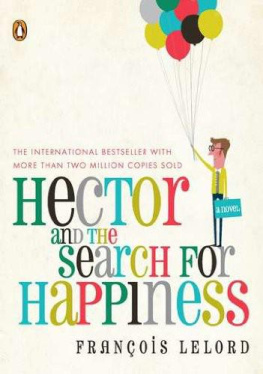ACKNOWLEDGEMENTS
I would like to thank my friends and their families for the hospitality they showed me during my visits to their countries prior to Hectors journey: Hans and Elisabeth, Peter and Margaret, Bob and his team at UCLA, Siew and Khai, Marie-Josphine and Cyril. Many thanks also to tienne for having introduced me to the Middle Kingdom, and to Nicolas for making himself available and being such an excellent guide. I am similarly grateful to the Aviation Medical Assistance Act, which now protects doctors who provide medical assistance during commercial flights. I would also like to extend my gratitude to everybody at ditions Odile Jacob, and in particular to the readers of Hectors earliest adventures: Jean-Luc Fidel, Catherine Meyer, Ccile Andrier, Jean-Jrme Renucci. My special thanks to my publishers Odile Jacob and Bernard Gottlieb for having welcomed and supported this book, so different from my former ones.
HECTOR IS DISSATISFIED
ONCE upon a time there was a young psychiatrist called Hector who was not very satisfied with himself.
Hector was not very satisfied with himself, even though he looked just like a real psychiatrist: he wore little round glasses that made him look intellectual; he knew how to listen to people sympathetically, saying mmm; he even had a little moustache, which he twirled when he was thinking very hard.
His consulting room also looked just like a real psychiatrists. There was an old couch (a present from his mother when he moved in), copies of Egyptian and Hindu statuettes, and a large bookcase full of complicated books, some of them so complicated he had not even read them.
Many people wanted to make an appointment with Hector, not just because he looked like a real psychiatrist, but because he had a gift that all good doctors have and that you cant simply learn at college: he really was interested in people.
The first time people go to a psychiatrist, theyre often a bit embarrassed. They worry the psychiatrist will think theyre mad even though they know hes used to it. Or else they worry that he wont think their case is serious enough and will tell them to take their troubles elsewhere. But since theyve made the appointment and kept it, they decide to recount their odd little quirks, the strange thoughts they havent told anyone about before but that make them unhappy, the great fears or deep sorrows that prevent them from living life to the full. They also worry that they wont express themselves properly and that they will be boring. And it must be said that sometimes psychiatrists do look bored, or tired. If you werent used to it you might wonder if they really were listening to you.
But with Hector it was almost never like that. He looked at people as they told their story, he nodded in encouragement, made his little mmm-hmm noises, twirled his moustache and sometimes hed even say, Wait, explain that again. I didnt quite understand. Except on days when he was very tired, people really felt that Hector was listening to what they had to say and finding it interesting.
So people came back to see him, they made lots of appointments, gave his name to their friends, and mentioned him to their doctors, who sent other patients to him. And soon Hector spent long days listening to people and had a lot of tax to pay, even though he didnt charge much for a consultation. (His mother was always telling him he should charge more, but he didnt feel he should.)
He charged less for his consultations, for example, than Madame Irina, who was quite a well-known psychic. She would say to him, Doctor, you should put up your fees.
So Ive been told, Hector would reply.
Im saying it for your own good, Doctor, I can see whats best for you.
Im sure you can. And how are you seeing these days?
It should be explained that Madame Irina had come to consult Hector because she could no longer see into the future. Her heart had been broken when a man had left her, and ever since then she couldnt see properly any more. As she was clever, she was able to find interesting things to tell her clients. But as she was not completely dishonest either, it troubled her not being able to see as before. And so Hector had given her pills for people who feel very sad, and gradually she was regaining her ability to see.
Hector didnt know what to make of it.
He wasnt just successful because he knew how to listen to people. He also knew all the tricks of his trade.
First of all, he knew how to answer a question with another question. For example, when people asked him, Do you think Im going to get better, Doctor? he would reply: What does getting better mean to you? In this way Hector helped people to think about their own case and find their own ways of getting better.
He also knew all about medication. In psychiatry thats quite simple since there are only four main types of medication that can be prescribed: pills to take when youre sad - antidepressants; pills to take when youre scared - tranquillisers; pills to take when you have very strange thoughts and hear voices - anti-psychotics; and then pills to avoid highs that are too high or lows that are too low - mood stabilisers. Actually, its a bit more complicated than that because for each type of medication there are at least ten different brands of pill, all with funny-sounding names that have been made up specially, and the psychiatrists job is to find the most suitable one for his patient. Pills are a bit like sweets: not everybody likes the same ones.
And when medication wasnt enough, or when people had no need for it, Hector had another way of helping them: psychotherapy. A complicated name for simply helping people by listening and talking to them. Not just talking to them any old how, but following a special method. As with pills, there are different types of psychotherapy, some of them invented by people who have been dead a long time. Hector had learnt a method of psychotherapy invented by people who were still alive, if rather old. According to this method, the psychiatrist talked to the patients as well as listening to them and this went down well, especially with those who had encountered psychiatrists who barely spoke to them, which they simply couldnt get used to.
In Madame Irinas case, Hector hadnt used much psychotherapy because whenever he was about to ask her a question she would say, I know what youre going to ask me, Doctor.
The worst of it was that she was often (but not always) right.
And so, using the tricks of his trade - medication, psychotherapy and his gift of being genuinely interested in people - Hector was quite a good psychiatrist. Thats to say, he was as successful as any good doctor, a cardiologist for example. He managed to cure some of his patients completely. Others he kept in good health provided they took their medication every day and came to talk to him from time to time. And finally there were some patients whom he merely managed to help live with their condition by making it as bearable as possible.
And yet Hector felt dissatisfied.
He felt dissatisfied because he could see perfectly well that he couldnt make people happy.
HECTOR HAS DOUBTS
HECTORS practice was in a city full of wide avenues lined with attractive old buildings. This city differed from most of the worlds big cities: the inhabitants had plenty to eat; if they were ill they could receive free medical treatment; children went to school, and most people had a job. They could also go to lots of different showings at the cinema that werent too expensive; there were museums, swimming pools and even special places to ride bicycles without being run over. People could also watch lots of different TV channels, read all sorts of newspapers, and journalists were free to write almost whatever they wanted. People had plenty of time off, even though this could be a problem for those who didnt have enough money to go away on holiday.














